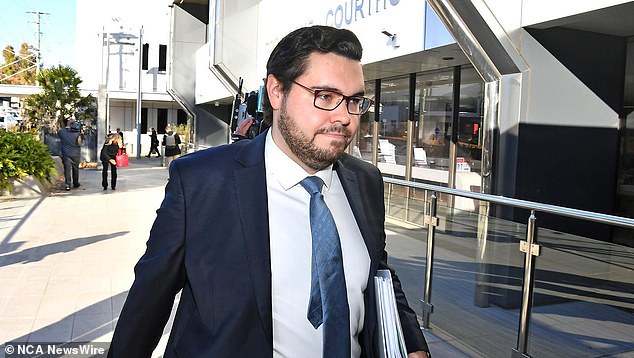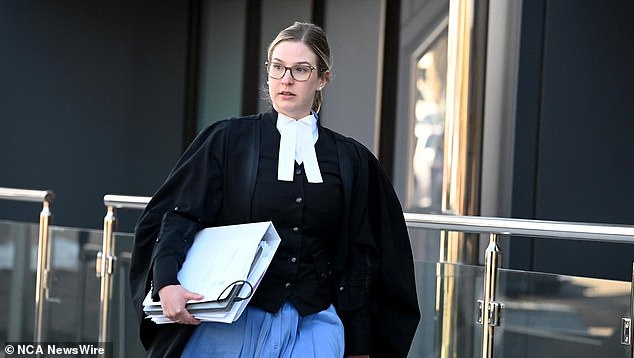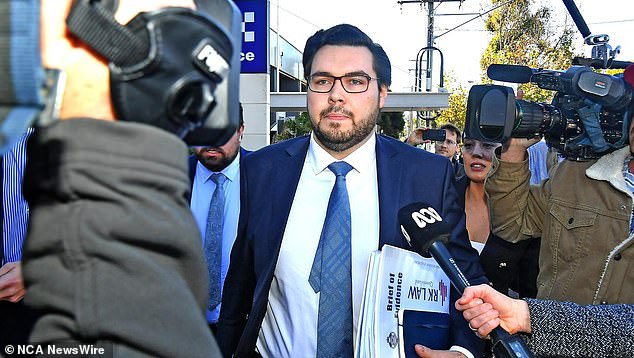The woman who claims she was raped by former parliamentary staffer Bruce Lehrmann claims he uttered four words while having non-consensual sex with her, a court has heard.
Lehrmann appeared in Toowoomba Magistrates Court last month for a preliminary hearing on the two rape offences that police say occurred in the regional Queensland city three years ago.
It was the first time he appeared in court in person since the charges were filed last year.
Lehrmann was excused from attending court on Thursday and instead appeared remotely by telephone.
Asked if Lehrmann wanted to enter a plea, he told the court: “Not at this time, thank you, Your Honor.”
Lehrmann’s legal team argued that he had no case to answer during Thursday’s court proceedings.
Prosecutor Nicole Friedewald said the case against Lehrmann includes two counts of rape.
Bruce Lehrmann is expected to learn whether he will stand trial in a higher court for the alleged rape of a woman in 2021. Image: NewsWire / John Gass
The first charge alleges that the complainant “woke up” to find that Lehrmann had allegedly had sexual intercourse with her without her consent.
The woman allegedly prevented Lehrmann from having sex with her by telling him “stop, what are you doing?”, Friedewald told the court.
The second charge against Lehrmann alleges that moments later, he again had sexual intercourse with the woman without her consent.
Ms Friedewald said the complainant told police that during the second incident she was “not very enthusiastically lying down” while Lehrmann was allegedly having sex with her.
Ms Friedewald told the court the woman also alleged that while this was happening, Lehrmann was “comforting her throughout the act” by telling her “it’s okay, it’s okay” and that he was not using a condom at the time.
“She says her body was limp and she was not enthusiastic. He continued to have sex with her until he ejaculated inside her,” Freidewald said.
The court was told that while the couple had consensual sex after meeting each other hours earlier, the Crown will argue that the complainant did not consent to sex after waking up.

Bruce Lehrmann appeared in Toowoomba Magistrates Court in June for the first time since the charges were laid, but was excused from attending Thursday’s proceedings. Photo: NewsWire / John Gass
Lehrmann’s lawyer, Andrew Hoare KC, said the complainant’s statements to others contradicted what she said when she reported the incident to police on November 26.
Mr Hoare said that approximately two hours after the alleged sexual assault, the complainant completed paperwork at a pharmacy where she was attempting to access the morning-after pill.
The court heard the form has an option for the person to select “sexual assault” as a reason for emergency contraception.
“The plaintiff does not meet that requirement and it must be said that meeting a requirement is something very different from any kind of narrative,” Hoare said.
Mr Hoare told the court the woman also failed to report the alleged sexual assault to her doctor during several appointments between the alleged incident and the initial report to police.
The court will allege that Lehrmann had given the woman a false name of “Bryce” when the couple met, before clarifying that his name is “Bruce”.
The court was told that the complainant had also spoken to a friend about the incident before reporting the matter to the police.
“Then there is the intervention of the complainant’s (friend), who crystallizes the complainant’s state of mind,” he explained.
‘It is (the friend) who has suggested that (the complainant) has been sexually assaulted and it is after that that the (allegation of) sexual assault is made.
‘Her uncertainty about the facts themselves, and certainly until (her friend) crystallised them, does not show any subjective belief that she was sexually assaulted.
‘What is being said is that the statement now made by the plaintiff in respect of count one is inconsistent with disclosures made to others and inconsistent with a document which she herself created, which is the reason for wanting the morning-after pill.’
The court was told the complainant first met with a civil lawyer and a criminal lawyer before meeting with police the day after learning who Lehrmann was.
The court was told that the plaintiff had been drinking alcohol and taking cocaine before meeting Lehrmann at the nightclub.
The pair also allegedly used cocaine together before having consensual sex, the court heard.
Mr Hoare said the complainant’s alcohol and drug use could explain why she had no recollection of some of the events that occurred in the bedroom with Lehrmann.
“The doctor’s conclusion is that, even in the absence of memory, the complainant is capable of consenting to, but not of recalling, the circumstances surrounding the act now the subject of the complaint,” Hoare said, referring to an expert medical witness who gave evidence about the impact of alcohol and drug use on a person’s memory.
The court was told that while the expert witness did not analyse the woman’s medical records, he gave his professional medical opinion on the alleged scenario that night and how alcohol and drug use can lead to “fragmented memory loss”.
Ms Friedewald said the Crown would argue that while there was initial consent to the first sexual act, the complainant’s actions after waking up or regaining consciousness should have been an indication to Lehrmann that he no longer had consent to have sexual intercourse with her.

Crown Prosecutor Nicole Friedewald. Photo: NewsWire / John Gass
“While there is some contextual relevance to the fact that they had consensual sexual relations… that does not mean that there was consent for each or every sexual act or for penetration in every act,” he said.
‘In terms of the complainant’s testimony, it is clear, it is unequivocal, that she was unconscious at the time (of the first charge of rape).
“If the jury can accept her testimony, they can accept that she was not a consenting party to the act.”
Ms Freidewald said it was “not unusual” for an alleged rape victim to not report the matter immediately.
Referring to the complainant who told her friend about the interaction with Lehrmann, Ms Freidewald said the messages between the two women were “significant” in showing that the friend did not “plant the idea of sexual assault or rape in the complainant’s mind for the first time”.
The court was told that the complainant responded to her friend’s message that she should report the incident to the police with a “who’s going to believe me?”
At the latest hearing on 17 June, only one witness – the complainant in the alleged case – was questioned by Lehrmann’s legal team during the closed-door proceedings.
Media organisations including News Corp Australia have asked the court for permission to report on court evidence behind closed doors during the trial.
Representing the media, attorney Jessica Goldie argued that the move would not be detrimental to the plaintiff.
She told the court that the presence of the media during the proceedings would allow for fair and accurate reporting of the proceedings and allow the media to perform its public interest function of “appropriately reporting” on alleged serious sexual offences.
“Both reflect the principles of open justice, which is a fundamental and important proposition for our legal system,” Ms Goldie said.
Ms Goldie said Lehrmann’s case was unique and had attracted a high degree of national interest and media coverage.
But Lehrmann’s lawyer, Andrew Hoare, said there was a risk the complainant could be identified from her testimony.
The application was also rejected by the Crown, which told the court that the complainant herself had opposed the application to protect her privacy.
Judge Mark Howden ultimately rejected the application, although he noted the high level of public interest.
‘However, in the Court’s view no basis has been raised which would change the position that it would not be detrimental to the applicant’s interests.
“In my opinion, the matter should follow its normal course.”
Lehrmann was charged in December 2022 with raping a woman in Toowoomba in October of the previous year.
At the time of his first court appearance in January 2023, Lehrmann was only known as a “high-profile man” in media reports about the allegations, due to Queensland laws prohibiting the identification of people accused of prescribed sexual offences before they are sent to trial.
But this legislation was changed by the state government on October 3 last year.
Lehrmann’s legal team then filed a last-minute request with the state’s highest court in an attempt to keep his identity protected.
This non-publication order was later revoked.

